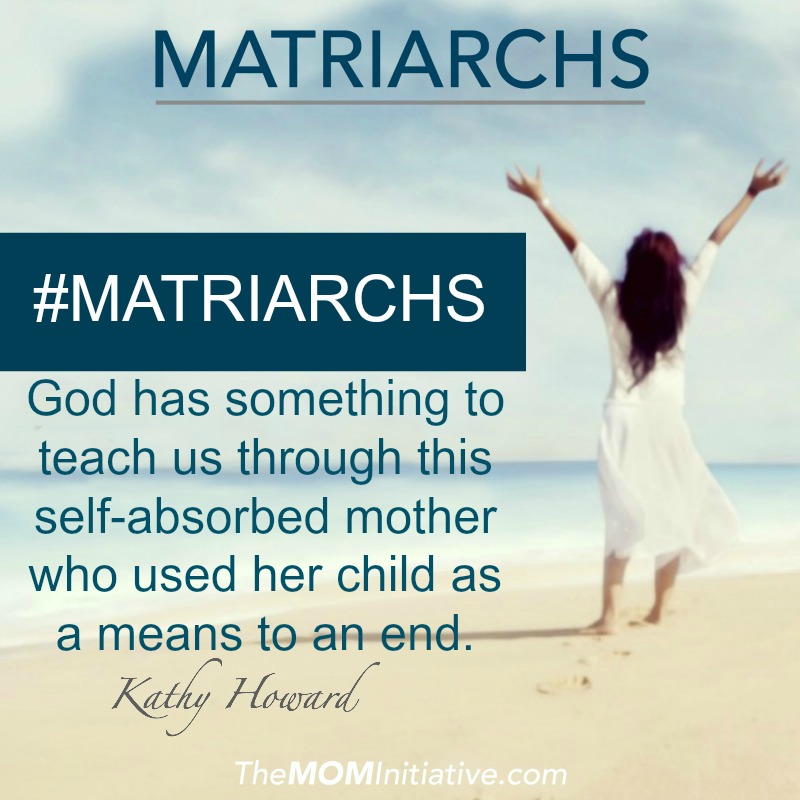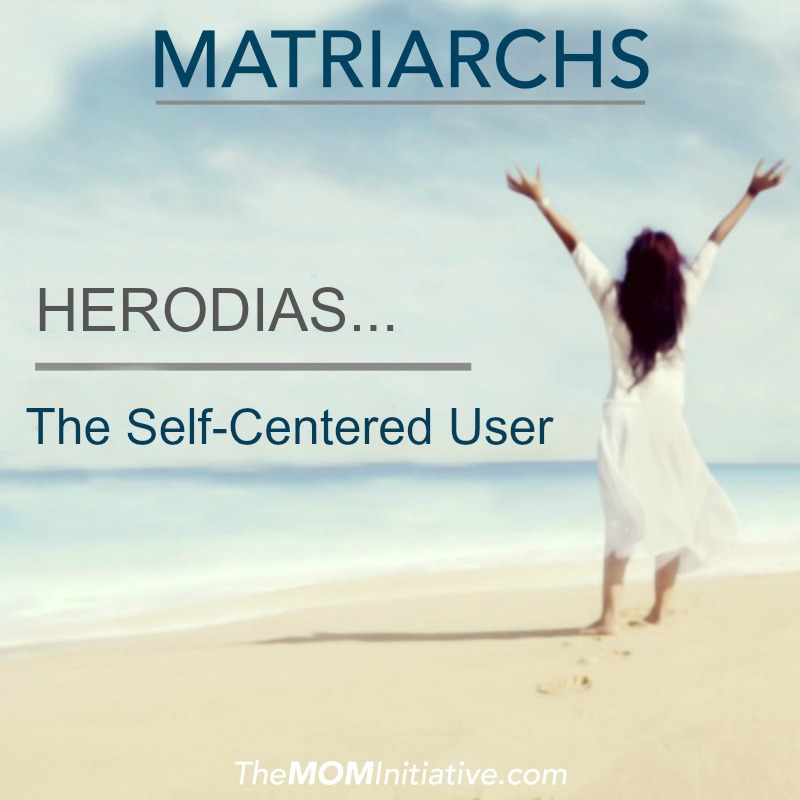MATRIARCHS: Herodias – The Self-Centered User
Welcome to Week 12 of MATRIARCHS!
Study God’s Word with us online or use them in your small group or Sunday School class!
Each lesson includes:
- Teaching video every Monday (15-20 minutes)
- Short lesson provided as the content of the post
- In-depth downloadable PDF to deepen your study
- Worksheets that take you even deeper
ALL LESSONS ARE FREE AND YOU CAN MAKE AS MANY COPIES AS YOU’D LIKE!
Week 1: Eve – A Mother Like No Other
Week 2: Sarah – Mother of Nations
Week 3: Rebekah – Mothering Through Barrenness
Week 4: Mary – Stubbornly Inflexible or Sacredly Flexible
Week 5: Naomi – Not Forsaken
Week 6: Jochebed – Desperate Times, Desperate Measures
Week 7: Hannah – What to Do When God Is Silent
Week 8: Haggar – The God Who Sees and Hears
Week 9: Bathsheba – Daughter of Abundance
Week 10: Elizabeth – Mom Knows Best or God Knows Best?
Week 11: Salome – You Take the Good, You Take the Bad
HERODIAS: The Self-Centered User
Below is the video lesson guide. Please CLICK THIS LINK to download your FREE in-depth Bible Study of Herodias and gain a more extensive and life-changing understanding of God’s Word. There is also a link to the video session coming soon!

I did not want to write about Herodias. She was my last choice. I would have taken any mother other than this mother. But I waited too late to volunteer. Herodias was the only mother left.
After all, what we could learn about mothering from Herodias? Scripture doesn’t say one nice thing about her. We don’t see even one redeeming quality. Only negative.
Then I realized God had something to teach me – and you – in this story of a self-absorbed mother who used her child as a means to an end. While none of us likely come close to rivaling this totally self-centered user, we can study Herodias as an example of what NOT to do.
Herodias probably used all the people in her life to get what she wanted. She used men to get power. And she used her daughter to get revenge on her enemy. Unfortunately, even the best and most godly mothers can fall into the role of “self-centered user” from time to time.
Things like fleshly desires, ambition, and even old hurts rise up and before we know it, we find ourselves selfishly using our children. Here are four possible scenarious we must guard ourselves against:
- Using our kids as a trophy – We encourage, push, and maybe even scold our children in hopes they’ll be the star football player or class valedictorian. And why? Is it for their good? Maybe partly. But often it’s to feed our own egos. So we can say, “Well, my son did this… or my daughter succeeded at that…”
- Using our kids as a substitute – We all have unfulfilled ambitions from our childhood. That’s not a failing, that’s just life. However, sometimes we parents think we can live out that dream through our children. So we push them to achieve what we didn’t.
- Using our kids as a tool – Sometimes parents use their kids to do their “dirty work.” For instance, if I don’t want to talk to the person on the phone I may get my son to tell them I’m not home. Whether out of laziness, guilt, or avoidance, we’ve all been guilty of using our kids to do something we don’t want to do – or even shouldn’t do – ourselves.
- Using our kids as a weapon – Have you ever used your child as a “go between” when you were angry at your spouse? Some divorces get so difficult that one spouse will even withhold the children from the other as a way to cause pain. From little hurts to big, any of us could fall to the temptation to use our children as a weapon.
Today’s matriarch, Herodias, was the ultimate self-centered user. She used her daughter as both a tool and a weapon to further her own agenda. Herodias’ story in the Bible is brief, but it packs a killer punch.
Herodias’ Story
Pieces of Herodias’ story is found in several Gospel accounts but we will focus on Mark 6:14-29. The trouble began when John the Baptist rebuked Herod Antipas for stealing away and marrying his brother’s wife Herodias. Herod was the Roman-appointed ruler of Galilee and his brother Philip had a similar position over another less-prominent Israeli territory.
John boldly and repeatedly pointed out Herod’s sin with Herodias. It was against God’s moral law for him to have his brother’s wife (Leviticus 18:16 and Leviticus 20:21). Herodias wanted John silenced – permanently. Herod imprisoned John trying to pacify her, but knowing John was a righteous man of God, Herod refused to have him executed.
So Herodias watched and waited. She knew her opportunity would come and when it did she would get what she wanted. Herodias was a master manipulator and she would use whatever means necessary. Including her daughter.
Soon the “opportune time” arrived. Herod threw himself a big party for his birthday. This shindig was guys only, more like a rowdy stag party than a simple birthday dinner. Young Salome, Herodias’ daughter by Philip, danced for Herod and his party guests. When Salome’s dancing pleased Herod, he boastfully promised something he didn’t even have the power to give – “up to half my kingdom!”
This was the moment Herodias had been waiting for and she pounced on it. She used her daughter and even her husband Herod to accomplish what Herod had prevented – the death of John the Baptist.
Salome knew to take Herod’s offer straight to her mother. With her desire finally realized, she sent Salome back, prompted by her mother’s selfish wishes. “I want you to give me right now the head of John the Baptist on a platter.”
Sadly, Herod saw no way of escape. He had made a reckless promise in front of important people. To withdraw his offer would mean personal humiliation. And Herodias knew that too. That was part of her plan. The self-centered user got exactly what she wanted.
What can we learn from Herodias?
I’m sure none of us have used our child as a murder weapon. But we have all used our children to one degree or another. Maybe we pushed them in the direction we wanted them to go. Maybe we asked them to stretch the truth for our convenience. But we all sometimes act selfishly and our children get caught up in the consequences. Our actions, attitudes, and motives will affect our kids. Our character and behavior will at least partly shape their character and behavior. The results of what we do will also land on them.

Proactive parenting steps we learned from Herodias
Let’s end our study on a positive note! God can certainly teach us good parenting skills even from a totally negative example. Here’s what He has reinforced in my own mind:
- Remember that your child is individually valued by God. God has specific plans and purposes for your child that are different from the ones He has for you. Help your child discover his unique purpose!
- Ask God to make you sensitive to any behavior that is selfishly motivated. Then repent immediately!
- Purposefully model Christ-like character and godly behavior for your children.
What actions, words, or attitudes in your life negatively affects your children? What can you do now to help shape your children to be more like Jesus?

If this lesson has spoken to your heart… if God has used it, please be sure to leave a comment and please share on your social media outlets using the hashtag #MATRIARCHS
- Let’s Say Grace: Slow Cooker Chicken Alfredo Recipe - September 24, 2016
- Lavish Grace Week 1: The What, When, and Why of Grace - September 19, 2016
- LAVISH GRACE: Poured Out, Poured Through, and Overflowing Online Bible Study - September 8, 2016



